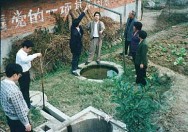
Sanitation professionals – says Rose George in The Big Necessity; the Unmentionable World of Human Waste and Why it Matters – divide cultures into the faeco-philiac and the faeco-phobic. India, excepting cow-dung, is the latter. China is the former. China has fertilised with human excrement for 4000 years.
This regard for excrement as treasure no doubt explains the dearth of scatological swear words in Chinese languages. Now it is taking another turn, as movements like the Shaanxi Mothers Environmental Protection Volunteer Organisation in Yan’an gradually replace traditional backyard long-drop and bucket latrines with anaerobic digesters. See their video here:
The digesters produce biogas – mostly methane, with some CO2 and a whiff of hydrogen sulphide – used for cooking, lighting and electricity generation. In a province suffering desertification from felling trees for fuel, the eco-benefits are patent. As well, the solid residue offers a far safer fertiliser than raw sewage. Villagers find themselves producing better crops, healthier children (fewer latrine-borne diseases), more money (lower energy and health costs) and, in some cases for the first time, leisure.
Lille, in France, runs a bus fleet on excreta-generated biogas. Even in sanitation-obsessed America, over a third of new houses come with on-site sewage disposal systems. With active support from the Environmental Protection Agency, some 60 million US households are now off-grid, sewage-wise, and a similar increase, on a much smaller scale, is taking place in eco-conscious New Zealand.
Here we remain staunchly faeco-phobic. Although some 2 million people use on-site wastewater disposal (such as septic tanks), these are still generally seen as a B-grade option, to be replaced by “proper” sewers.
Yet attitudes are changing. The Australian and New Zealand Biosolids Partnership reports some 270,000 tonnes of bio-solids – about 60 per cent of our total – are strewn across Australian fields annually, with a further 5 per cent used for compost. It concurs, further, with US findings, that when regulations are followed, “there is no scientific evidence of any toxic effect to soil organisms, plants … or to humans (via acute effects or bio-accumulation) … [or] of illness caused by biosolids”.
Some people believe, probably wrongly on the evidence, sewage mining – extracting minerals, metals, even precious metals – will resource the future. But using it instead of Dynamic Lifter (to which it is roughly nutritionally equivalent) saves petrochemicals, zooplankton and money.
And it goes past biology. As Kundera famously noted, our steadfast ignorance “of the invisible Venice of shit underlying our bathrooms, bedrooms, dance halls, and parliaments” steeps us in kitsch. Worse, I’d say, it denies us both our regard for our bodies as high-design recycling devices and our reverence for nature’s essential gift, which is, shit happens.
